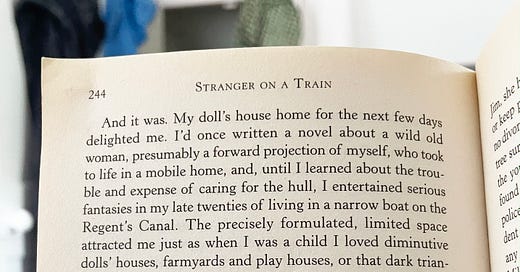Since recovering from a stomach bug, I have developed an ear infection. I am dizzy and distant from the world, with no clear sound. It is as if I were inhabiting the world from behind a glass wall. My thoughts are not clear either. I seem to have lost the ability to organise them so that I can tell stories or make sense, both to myself and to others. It is lonely and strange to feel as if you are trapped inside yourself. I am grateful that this is only a temporary situation.
My inability to hear coincided with reading ‘Stranger on the Train’ by Jenny Diski and ‘The Salt Path’, a scandal that has dominated my feeds this past week. I have never read ‘The Salt Path.’ If a book is described as life-affirming, uplifting, or inspiring, then I don’t want to read it. Especially if it is non-fiction, I accept the existence of a redemptive character arc in fiction. I will even enjoy such an arc if I’m at a particularly fragile point in my menstrual cycle. I cannot stomach them in memoir because how can you get to 43 without realising that redemptive character arcs don’t happen in real life?
‘Stranger on a Train’ is a travelogue first published in 2002, in which Jenni Diski travels around the USA on a train, mainly inhabiting the smoking carriage. The book is about the people she meets on her travels, with moments of self-reflection and memories interspersed almost tantalisingly. It is a book about being someone who struggles to connect with the world and its fellow inhabitants and yet manages to occasionally bridge the gap by listening and observing her fellow travellers, in a way that you can when you’re exiled in the smoking area on a long-distance train. Yet when she tries to bridge it further by going to stay with a woman she befriends on her travels, she pushes herself too far and reinforces her alienation.
Yet I found ‘Stranger on a Train’ uplifting. Because, despite her misanthropy, Jenny is fascinated by human beings in all their flawed glory, and in her way revels in the joy of everyday people and how much weirder and more interesting they are than you could ever invent. The following extract was one of those reading moments when it seemed someone had lifted the top of my skull and looked inside my brain. How I have always felt about the world, but never quite been able to articulate, is perfectly expressed.
In Stranger on a Train, Jenny does not improve as a person or learn important lessons about life. She ends just as much her complex, uncomfortable and solitary self as when she began it. I found this immensely comforting. The narrative of personal growth that seems to have dominated mainstream culture for as long as I have been able to read, is a con that sets us all up to fail and makes us so concerned with trying live our redemptive character arc that we miss all the small hilarious moments that reveal how psychedelically odd and interesting humanity is.
Jenny Diski gets much closer to the sublime through her deadpan account of chainsmoking with her fellow travellers in a dingy compartment whilst the flat, empty Midwestern landscape rattles past than any memoir that could be described as ‘life-affirming’ ever could. And she doesn’t claim that you can cure terminal degenerative illnesses through walking and connecting with nature, either, which is always a plus.
I have more to write about, a recent experience where I had an impromptu tour of the abandoned hopping huts in the Kentish Weald amongst others, but that can wait until next week, when hopefully I can hear and my balance is restored, and I can give the topic the attention it deserves.
In the meantime, here is a photograph of my studio wall adorned with works on paper that will soon be available in a new online shop I am setting up.
Here is a recent pet portrait commission, featuring the two sides of ‘Martha’. Please visit my website to learn more about prices and the process.








I've not read any Jenny Diski. Remedying that immediately. Love your posts Alice.